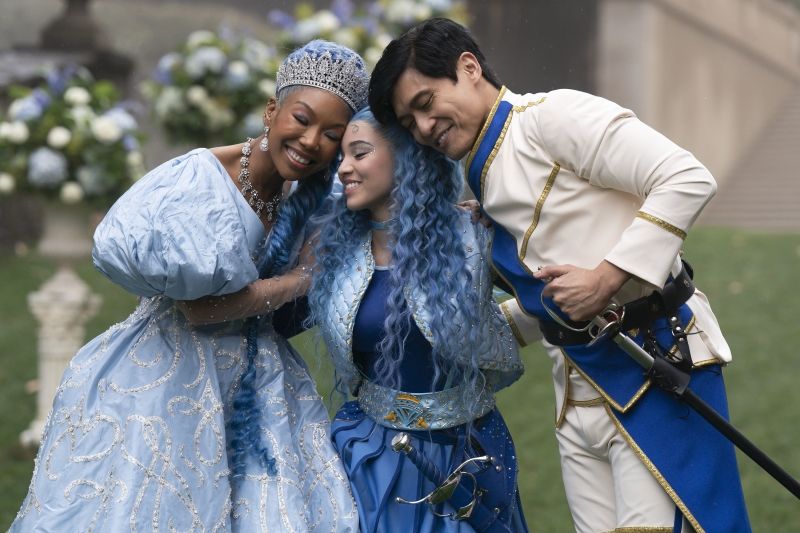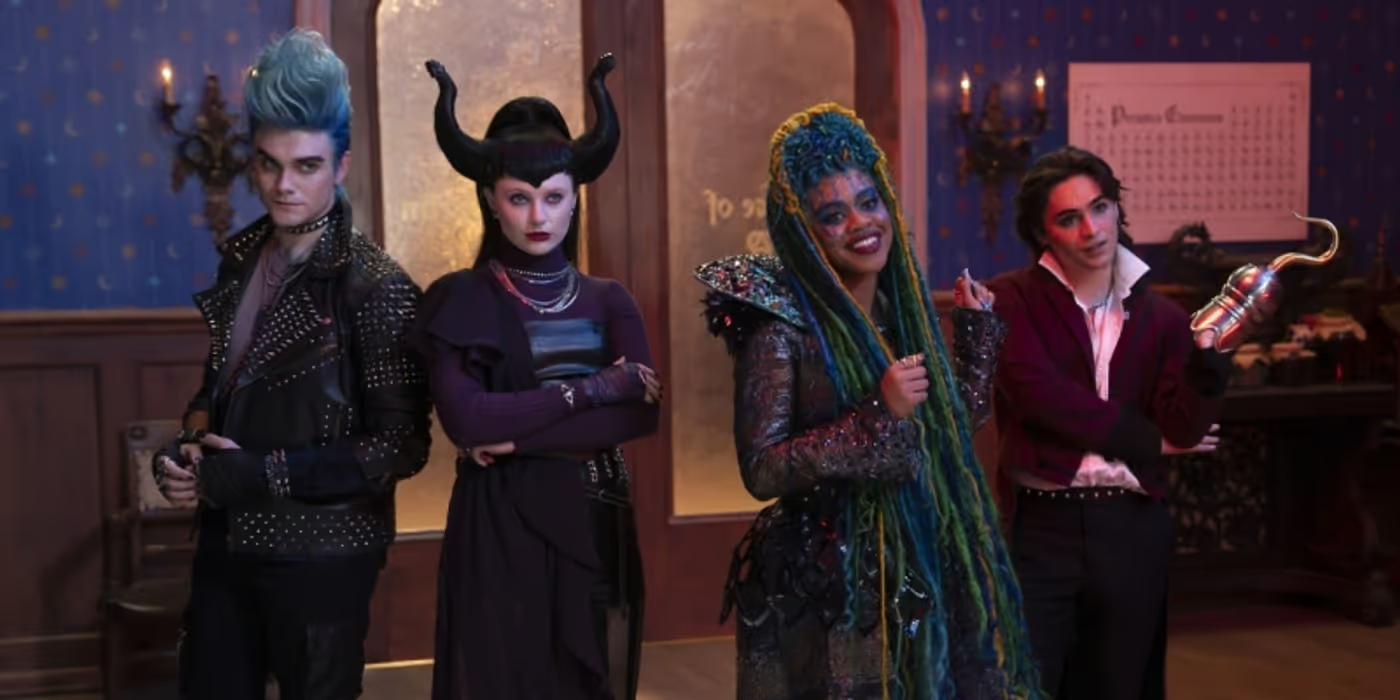Interview: Ashley Wallen Discusses the Movement of DESCENDANTS: THE RISE OF RED
Descendants: The Rise Of Red premieres July 12 on Disney+.
 It's time to take out your magic wands, Descendants fans.
It's time to take out your magic wands, Descendants fans.
Following a 5-year gap with no new movies in the beloved franchise, Descendants: The Rise of Red will be hitting small screens this Friday, July 12. In addition to simply being enjoyable fodder for Disney buffs of all ages, these fairy tale reimaginings have taken on an identity of their own within the Disney and Broadway communities. The previous three original movies have featured such stage alums as Kristin Chenoweth, Cheyenne Jackson, and Dove Cameron.
The musical and visual language of the movies exists in a unique realm between a music video and a more traditional movie musical. In their retelling of Disney classics, they are punctuated with songs accompanied by intricately staged dance numbers. This movement is critical to what makes Descendants both distinct and beloved.
BroadwayWorld sat down with choreographer Ashley Wallen to discuss this new entry in the Descendants franchise, from his approach to the material as a dancer himself to the differences between choreographing for movies and the stage.
This interview has been condensed for clarity and length.
Descendants is a pre-established world and a big franchise. What was your previous experience with the material?
I went and watched most of them just to get an idea of the films. But, I really wanted to go into this one with fresh eyes and a new take on how I would do the numbers. It was a bit nerve-wracking because they've had a lot of amazing choreographers work on these films. And Kenny Ortega, obviously, who did the previous films. It was a big task, but it was exciting to go in and do my fresh take on the new film.
I discovered that you were a masquerade dancer in The Phantom of the Opera film. How has your experience as a dancer in films yourself impacted the way you approach your job as a choreographer?
Being a dancer- and especially being a dancer on film- is such a great thing because I know what it's like to be on set when you've got to bust out these high-energy routines all day for nine, ten hours. When I'm on set, I'm very aware of how people are: their bodies and if they can do it again. I've been the dancer on set when they're like, "Again!" and you just need a minute. The takeaway of being a dancer has helped me make sure all the young dancers and everyone on set are taken care of when they need to do it over and over again.
When you begin a number, do you tend to cater to the performer's strengths?
With the actors, I went and looked at their Instagram for some of them to see if they could dance. But then, I did a session with each of them to see what they were like and how they could move. Definitely, as a choreographer, I need to make sure they look great at what they're doing and also still push them to something that they can achieve. It's very much about building a language that suits them and their strengths movement-wise. The routines are built with them so they can say "Oh no, I think I might want to do this" or "This feels better on me." It's definitely a collaborative thing with the artists.
How much rehearsal time did you have before filming began, and how do you maximize that time for the best results?
I did a broken-down skeleton crew with not many dancers, around 8 or 10. We probably did a week of stuff in a dance studio to shoot the numbers out, and had dancers play the different characters for the creative team to get a feel of what they might be and what the numbers might look like.
And then, obviously, a lot of that stuff gets changed. I usually work with the dancers first to get a picture of it and then put the principal actors and the main kids into it. I think we probably had about four or five rehearsal days on each number. Then we'd do it on set and shoot it out properly. We're super prepared as we walk in before the cameras roll because it was very condensed hours of what we had to do and what we needed to achieve.

How do you approach choreographing for musical theatre or a musical film as opposed to something like a music video? Is there a difference?
Theater and film are so different. I just came off working on Sunset Boulevard in Australia and hadn't done a theater show for so long. In film, you figure out the camera, and maybe this person over here may not have to do anything. But in theater, you've got a cast and everyone has to be on all the time. You can't just push a camera in and come around and find that person. It's a very different way of thinking. For me, I love doing film stuff because I love the other side of using the camera. It's a great thing for me to do.
How do you let the character’s motivations influence the movement that you choreograph for the performers?
Sometimes the characters might just be dancing, but you've also got to remember the story before and think about their journey for the whole song. You can do a dance break that looks great, but you've got to think about where they've just come from and where they're about to go. It's a definite arc in these kind of numbers. And then you've got to try and capture that all with the cameras too and make sure you get that story across instead of it just being a visually beautiful thing.

How do space and set designs inhibit or enhance the movement?
It's very different. When we're in the open area in the school, you've got so much space to play with. You can go anywhere you like. And then you have the scene with Uliana (played by Dara Reneé) where she is inside this creature and you've only really got a front and a back. You don't have that much to play with. That's one where we thought it might be good for us to go a bit more music video, K-pop style. It was very much a performative space so we went with that style.
What does your collaboration process look like with other creatives such as the costumer when thinking about the movement of the costume and flow?
It's a funny one because you do all these dance routines and then costumes come in. Sometimes you just have to adjust to what that costume is, and sometimes the costumes are so amazing that you say, "I'll adjust that because it looks phenomenal." Then there are other times when you go "Actually, we really want to keep the dance, so can we maybe think about the shoes being a bit lower?" or whatever it might be. It's a definite collaborative thing. Everyone has to come on board with each other, with the actors and everyone. They know their story and their arc so sometimes they're like, "I'd probably do this." And you understand that because they know their story and how it will play out throughout the film.
The Descendants movies are all about Disney heroes and villains. Do you tend to gravitate more toward Disney protagonists or the bad guys?
Probably not the bad guys. My Disney obsession still to this day is Aladdin. I could probably sing every song from that film. I absolutely love it. To be a part of anything Disney has been a dream come true for me.
Descendants: The Rise of Red premieres Friday, July 12 on Disney+.
Watch a preview from the film below:
Photo Credit: Disney/Quantrell Colbert
Videos

